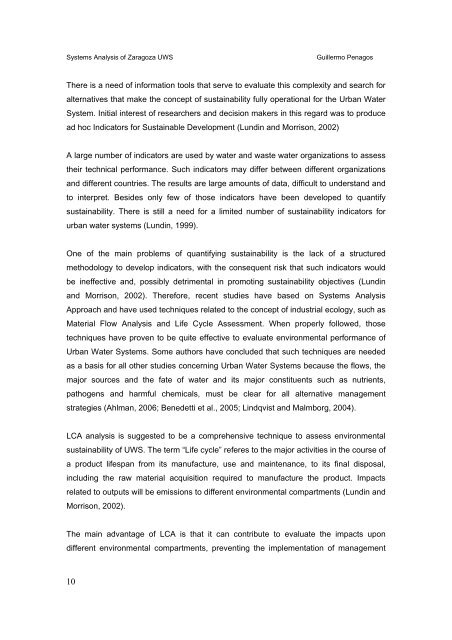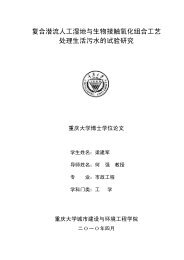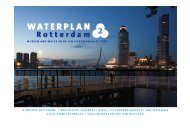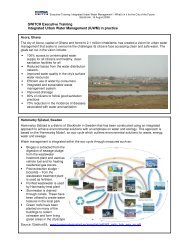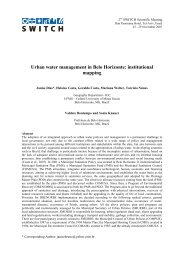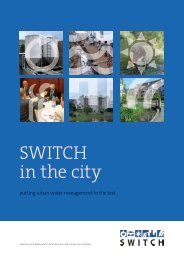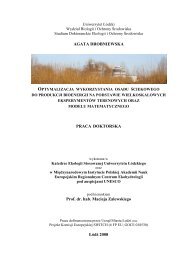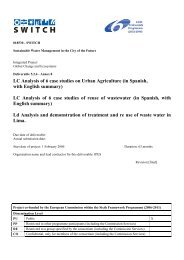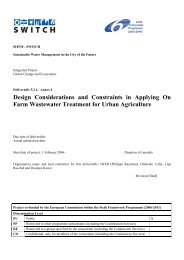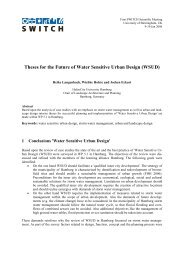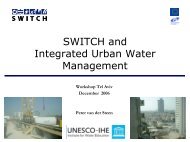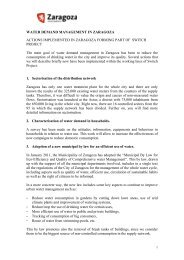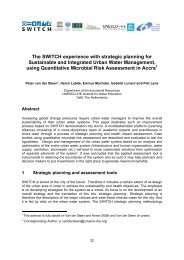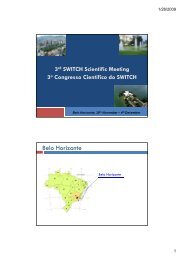Systems Analysis of Zaragoza Urban Water - SWITCH - Managing ...
Systems Analysis of Zaragoza Urban Water - SWITCH - Managing ...
Systems Analysis of Zaragoza Urban Water - SWITCH - Managing ...
You also want an ePaper? Increase the reach of your titles
YUMPU automatically turns print PDFs into web optimized ePapers that Google loves.
<strong>Systems</strong> <strong>Analysis</strong> <strong>of</strong> <strong>Zaragoza</strong> UWS<br />
Guillermo Penagos<br />
There is a need <strong>of</strong> information tools that serve to evaluate this complexity and search for<br />
alternatives that make the concept <strong>of</strong> sustainability fully operational for the <strong>Urban</strong> <strong>Water</strong><br />
System. Initial interest <strong>of</strong> researchers and decision makers in this regard was to produce<br />
ad hoc Indicators for Sustainable Development (Lundin and Morrison, 2002)<br />
A large number <strong>of</strong> indicators are used by water and waste water organizations to assess<br />
their technical performance. Such indicators may differ between different organizations<br />
and different countries. The results are large amounts <strong>of</strong> data, difficult to understand and<br />
to interpret. Besides only few <strong>of</strong> those indicators have been developed to quantify<br />
sustainability. There is still a need for a limited number <strong>of</strong> sustainability indicators for<br />
urban water systems (Lundin, 1999).<br />
One <strong>of</strong> the main problems <strong>of</strong> quantifying sustainability is the lack <strong>of</strong> a structured<br />
methodology to develop indicators, with the consequent risk that such indicators would<br />
be ineffective and, possibly detrimental in promoting sustainability objectives (Lundin<br />
and Morrison, 2002). Therefore, recent studies have based on <strong>Systems</strong> <strong>Analysis</strong><br />
Approach and have used techniques related to the concept <strong>of</strong> industrial ecology, such as<br />
Material Flow <strong>Analysis</strong> and Life Cycle Assessment. When properly followed, those<br />
techniques have proven to be quite effective to evaluate environmental performance <strong>of</strong><br />
<strong>Urban</strong> <strong>Water</strong> <strong>Systems</strong>. Some authors have concluded that such techniques are needed<br />
as a basis for all other studies concerning <strong>Urban</strong> <strong>Water</strong> <strong>Systems</strong> because the flows, the<br />
major sources and the fate <strong>of</strong> water and its major constituents such as nutrients,<br />
pathogens and harmful chemicals, must be clear for all alternative management<br />
strategies (Ahlman, 2006; Benedetti et al., 2005; Lindqvist and Malmborg, 2004).<br />
LCA analysis is suggested to be a comprehensive technique to assess environmental<br />
sustainability <strong>of</strong> UWS. The term “Life cycle” referes to the major activities in the course <strong>of</strong><br />
a product lifespan from its manufacture, use and maintenance, to its final disposal,<br />
including the raw material acquisition required to manufacture the product. Impacts<br />
related to outputs will be emissions to different environmental compartments (Lundin and<br />
Morrison, 2002).<br />
The main advantage <strong>of</strong> LCA is that it can contribute to evaluate the impacts upon<br />
different environmental compartments, preventing the implementation <strong>of</strong> management<br />
10


